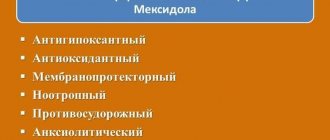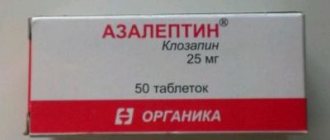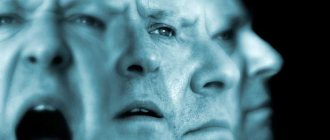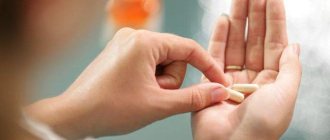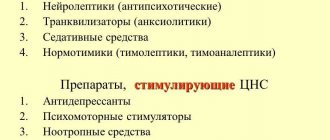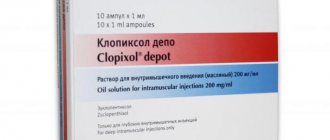There are restrictions during pregnancy
Has restrictions when breastfeeding
Has restrictions for children
Has restrictions for older people
Has limitations for liver problems
Has limitations for kidney problems
Risperidone belongs to the pharmacological group of monoamine antagonists and contains the active component of the same name. If you are allergic to the composition of Risperidone, your doctor will prescribe analogues based on a different active ingredient, but having a similar therapeutic effect on the body.
The drug suppresses the symptoms of schizophrenia, to a much lesser extent compared to other antipsychotics, suppressing motor activity and without causing catalepsy. The medication eliminates hallucinations, aggressiveness, delusional syndrome and various phobias.
Packaging of the drug Risperidone
Risperidone is prescribed for:
- chronic or acute phase of schizophrenia;
- psychosis;
- affective pathologies of various etiologies;
- manic syndrome (as part of combination treatment);
- delirium;
- aggressiveness and overexcitement.
Prescribed to adolescents over 15 years of age with impaired intellectual development and with increased emotionality, impulsivity and aggression.
Risperidone is not prescribed if you are allergic to the components in the composition or during lactation. Pregnant women are prescribed the medicine when there is a vital sign and under the supervision of a doctor.
You need to take Risperidone 1-2 times a day. Therapy should be started with a dosage of 2 mg, and after a day doubled. The maximum dosage per day is 10 mg. In rare cases, with severe pathology, the dosage is 16 mg. In adolescents and children weighing more than 50 kg, 1 mg per day is prescribed.
Side effects:
- dizziness, agitation, muscle weakness and tremors of the limbs;
- hyperthermia and disturbances in thermoregulation;
- dyspepsia and increased transaminase activity;
- arrhythmia, decreased blood pressure;
- disturbances in hemostasis;
- skin allergies – urticaria, itching, hyperthermia;
- Erectile dysfunction and enuresis in men;
- myalgia, arthralgia.
Pharmacodynamics
Effect of risperidone on receptors
It has a high affinity for serotonin 5-HT2 and dopamine D2 receptors. Binds to α1 adrenergic receptors and, with slightly lower affinity, to histamine H1 and α2 adrenergic receptors. Has no affinity for cholinergic receptors. Although risperidone is a potent D2 antagonist (which is believed to be the main mechanism for reducing the productive symptoms of schizophrenia), it causes slightly less pronounced suppression of motor activity and induces catalepsy to a lesser extent than classical antipsychotics. Due to balanced antagonism to serotonin and dopamine receptors in the central nervous system, the likelihood of developing extrapyramidal side effects is reduced. Risperidone may induce a dose-dependent increase in plasma prolactin concentrations.
Pharmacokinetics
After oral administration, risperidone is completely absorbed from the gastrointestinal tract, Cmax in the blood is reached within 1-2 hours. Food does not affect the absorption of risperidone. The CSS of risperidone in the body is achieved within 1 day in most patients. CSS of 9-hydroxyrisperidone is achieved within 4-5 days. Plasma concentrations of risperidone are dose proportional (over the therapeutic dose range). Risperidone is rapidly distributed in the body, Vd is 1-2 l/kg. In plasma, risperidone binds to albumin and α-1 glycoprotein. The binding of risperidone to plasma proteins is 88%, 9-hydroxyrisperidone - 77%. Risperidone is metabolized in the liver with the participation of the CYP2D6 isoenzyme of the cytochrome P450 system with the formation of 9-hydroxyrisperidone, which has a pharmacological effect similar to risperidone. The antipsychotic effect is due to the pharmacological activity of risperidone and 9-hydroxyrisperidone. Another pathway of risperidone metabolism is N-dealkylation. T½ of risperidone from blood plasma is 3 hours. T½ of 9-hydroxyrisperidone and the active antipsychotic fraction is 24 hours. After 1 week of administration, 70% is excreted in the urine, 14% in feces. In urine, the total content of risperidone and 9-hydroxyrisperidone is 35-45%. The rest is inactive metabolites. In elderly patients and in patients with renal failure, increased plasma concentrations and delayed elimination of risperidone were observed after a single oral dose.
General information about the drug Risperidone
The selection of a drug for the treatment of certain mental disorders should be purely individual. Risperidone is an antipsychotic drug that has been on the pharmaceutical market for a long time. It helps some patients significantly, but in others it only causes side effects, so opinions about it are controversial.
Action of neuroleptics
Drug group, INN, scope of application
Risperidone is an antipsychotic drug from the group of neuroleptics. The active substance is also called risperidone, international nonproprietary name is Risperidone. Used in psychiatry and neurology for the treatment of mental disorders of organic and inorganic origin.
Release forms and prices for the drug, average in Russia
The release form of the drug is film-coated tablets. Risperidone is produced by various factories (Northern Star, Rapharma, etc.). Below are prices in various pharmacy chains in Russia.
| Pharmacy | Dosage | Price in rubles |
| Online pharmacy DIALOG | 0,004 №30 | 160 |
| BALTIKA-MED | 0,002 №20 | 146 |
| 0,002 №30 | 156 | |
| 0,004 №30 | 157 | |
| PharmacyOnline | 0,002 №20 | 148 |
| Online pharmacy GORZDRAV | 0,004 №20 | 192 |
| Pharmacy "Be Healthy" | 0,002 №30 | 150 |
Composition of Risperidone
The tablets are capsule-shaped, coated, smooth to the touch. The color of the tablets depends on the dosage of the active substance. They also have a notch on both sides (with a dose of 2 and 4 mg).
1 tablet of the drug contains the active component - risperidone (in the amount of 4, 3, 2 or 1 mg), as well as excipients, such as:
- calcium phosphate;
- MCC;
- pyrogenic silicon dioxide;
- croscarmellose sodium;
- magnesium stearate;
- lactose monohydrate.
https://youtube.com/watch?v=tzozMYX-xBc
Pharmacodynamics and pharmacokinetics
Risperidone has a high affinity for certain types of dopamine and serotonin receptors in the central nervous system, and a low affinity for α2-adrenergic receptors and H1-serotonin receptors. It also has some effects on α1-adrenergic receptors. Risperidone does not have a significant inhibitory effect on motor activity, despite the fact that it is a D2-agonist, unlike other antipsychotic drugs.
It is the drug of choice for patients with productive symptoms; it can also have a beneficial effect on the negative symptoms of schizophrenia (apathy, drowsiness, fatigue). Risperidone has a broad therapeutic effect and is less likely to develop neuroleptic extrapyramidal disorders, since it has a balanced central effect on dopamine and 5-HT2 receptors.
Pharmacological properties
After oral use, the drug is quickly absorbed into the gastrointestinal tract, and after 2-3 hours its maximum concentration in the blood is reached. Meals do not affect bioavailability and can be taken before or after meals. Effectively binds to plasma proteins (approximately 80%). Distributed evenly throughout the body for 9 days. The concentration of Risperidone in the blood is inversely proportional to its dosage.
The drug is excreted from the body after 3 hours, and its metabolites after 24 hours. The elimination process is carried out with feces (15%) and urine (85%, of which 40% in the form of metabolites). Risperidone concentrations may increase sharply after a single dose in elderly patients or those with chronic kidney disease.
Analogs
Among the most effective similar means are:
- Sonapax. Refers to antipsychotic drugs, available in the form of tablets 10 and 25 mg. Prescribed to patients who suffer from diseases such as schizophrenia, neuroses, manic-depressive psychoses, behavioral disorders and withdrawal syndrome.
- Neuleptil. The active ingredient is periciazine. It has a hypnotic, sedative and antiemetic effect. It is excellent for correcting behavioral disorders due to its selective effect on brain receptors. Most often prescribed when aggressiveness appears against the background of mental disorders.
- Zeldox is an antipsychotic drug that has a high affinity for serotonin and dopamine receptors. Prescribed to patients who suffer from schizophrenia or bipolar disorder.
- Olanzapine is an atypical antipsychotic that is used in the treatment of affective disorders, mixed and manic attacks, schizophrenia, and other mental disorders that are accompanied by the development of negative and productive symptoms.
Application
Indications
- Symptomatic treatment of schizophrenia (including new-onset acute psychosis, acute attack of schizophrenia, chronic schizophrenia);
- Psychotic states with pronounced productive (hallucinations, delusions, thought disorders, hostility, suspicion) and/or negative (blunted affect, emotional and social detachment, poverty of speech) symptoms;
- To reduce affective symptoms (depression, guilt, anxiety) in patients with schizophrenia;
- Prevention of relapses (acute psychotic states) in chronic schizophrenia;
- Treatment of behavioral disorders in patients with dementia with symptoms of aggressiveness (outbursts of anger, physical violence), mental disorders (agitation, delirium, other psychotic symptoms).
- Treatment of mania in bipolar disorders (as a mood stabilizer as an adjuvant therapy).
- In 2006, the use of risperidone was approved in the United States for the symptomatic treatment of irritability in autism in children and adolescents[4].
Contraindications
Hypersensitivity to risperidone. Contrary to the belief that risperidone is effective for depression and obsessions, some authors argue that it is ineffective and contraindicated in these conditions[5]. Risperidone is contraindicated in Parkinson's disease, during the active period of seizure formation in epilepsy[6].
Use during pregnancy and breastfeeding
Use during pregnancy is possible if the expected benefit of therapy for the mother outweighs the potential risk to the fetus. If use is necessary during lactation, breastfeeding should be discontinued.
Use in pediatrics
There are no data on the safety of risperidone in children under 15 years of age.
In what situations is the medicine prescribed?
Risperidone is taken for the following indications:
- a condition of dementia that arose against the background of Alzheimer's disease;
- in case of bipolar type disorder;
- during the development of hallucinations that arise due to organic disorders in the brain;
- delusional schizophrenia-like disorder, which occurs due to organic disorders in the brain;
- during all types of schizophrenia, as well as hebephrenia;
- delusional and schizophrenic disorders with a chronic nature;
- psychoses with an inorganic nature of unspecified etiology;
- manic episodes;
- regular episodes of depressive disorders;
- obsessive-compulsive disorders;
- hallucinations of unspecified nature;
- sudden attacks of an aggressive nature;
- symptoms of autism.
Article on the topic: How to treat rotavirus infection
Dosage regimen
Individual. The initial dose for adults is 0.25-2 mg/day, on the 2nd day - 4 mg/day. Then the dose can either be kept at the same level or, if necessary, adjusted. Typically, the optimal therapeutic dose, depending on the indications, is in the range of 0.5-6 mg/day. In some cases, a slower dose escalation and lower initial and maintenance doses may be justified.
For schizophrenia of different ages, as well as for concomitant diseases of the liver and kidneys, an initial dose of 0.5 mg 2 times a day is recommended. If necessary, the dose can be increased to 1-2 mg 2 times a day. Maximum doses: When using risperidone at a dose of more than 10 mg/day, there is no increase in effectiveness compared to lower doses, but the risk of developing extrapyramidal symptoms increases. The safety of risperidone in doses greater than 16 mg/day has not been studied, so further excess of the dose is not allowed.
Composition and release form
The drug Risperidone is available in the dosage form of film-coated tablets for oral (oral) use. They are white in color, round in shape and have a biconvex surface. The main active component of the drug is risperidone, its content in one tablet is 2 and 4 mg. It also includes auxiliary components, which include:
- Talc.
- Corn starch.
- Microcrystalline cellulose.
- Stearic acid.
- Titanium dioxide.
- Magnesium stearate.
- Macrogol.
- Colloidal silicon dioxide.
Risperidone tablets are packaged in blister packs of 10 pieces. The cardboard pack contains 2 blister packs (20 tablets) and instructions for use of the drug.
Side effects
From the nervous system:
sedation[7], drowsiness, fatigue, insomnia, agitation, anxiety, headache, dizziness, difficulty concentrating, blurred vision, extrapyramidal symptoms (tremor, rigidity, hypersalivation, bradykinesia, akathisia, acute dystonia), mania or hypomania, stroke (in elderly patients with predisposing factors), hypervolemia (either due to polydipsia or due to the syndrome of inappropriate secretion of antidiuretic hormone), tardive dyskinesia (involuntary rhythmic movements mainly of the tongue and/or face), neuroleptic malignant syndrome (hyperthermia, muscle rigidity, instability of autonomic functions, impaired consciousness and increased levels of creatine phosphokinase), thermoregulation disorders and epileptic seizures. Risperidone causes extrapyramidal symptoms significantly more often than other atypical antipsychotics[8]; it also has a relatively high risk of tardive dyskinesia (if used in high doses)[9]. In patients with hyponatremia, risperidone may lead to seizures[7]. A side effect of risperidone can also be the development of depression[10]. Risperidone can cause negative disorders (in healthy volunteers, a single dose caused abulia, affective flattening and alogia)[11].
From the digestive system
: constipation, dyspepsia, nausea or vomiting, abdominal pain, increased activity of liver transaminases, dry mouth, hypo- or hypersalivation, anorexia and/or increased appetite, increased or decreased body weight. Liver dysfunction has been reported in young men taking risperidone following the onset of excess weight; Ultrasound examination revealed signs of fatty infiltration of the liver[12].
From the cardiovascular system:
prolongation of the QT interval[13], increased blood pressure, with high initial doses - orthostatic hypotension and reflex tachycardia[14].
From the hematopoietic organs:
thrombocytopenic purpura[7], neutropenia.
From the endocrine system:
often[15][16] (according to various sources, in 35-94% of cases[16]) causes hyperprolactinemia. Hyperprolactinemia can lead to decreased libido and impaired sexual function, amenorrhea, galactorrhea[17], gynecomastia, decreased or absent potency[18], infertility[18][19], hypertrichosis, seborrhea of the scalp, hair thinning, development of osteoporosis, the occurrence of cardiovascular disorders[18], weight gain, autoimmune disorders, water and electrolyte imbalance[15], the risk of developing breast cancer[17], type II diabetes mellitus[20], pituitary tumors[21]. Mental manifestations of long-term hyperprolactinemia may include depression, anxiety, irritability, sleep disturbances, as well as increased fatigue, weakness, and memory loss [18]. The increase in prolactin during risperidone therapy is more pronounced than during therapy with other atypical antipsychotics (except amisulpride), which are most often characterized by clinically insignificant transient hyperprolactinemia[22], and even more pronounced than during therapy with typical antipsychotics[23]. According to some data, taking risperidone causes the development of hyperprolactinemia in 35-94% of cases [16]. During therapy with risperidone, prolactin levels may be observed that are tens of times higher than the norm[24]. Risperidone may affect prolactin levels even when taken in low doses[25]. When treated with Rispolept Konsta (long-acting risperidone), hyperprolactinemia may persist for 6 months after discontinuation of the drug [26].
From the genitourinary system:
often - priapism, erectile dysfunction, ejaculation disorders, anorgasmia, urinary incontinence, rarely - adrenal tumor.
Allergic reactions:
rhinitis, skin rash[14], angioedema, photosensitivity.
From the skin:
dry skin, hyperpigmentation, itching.
Other:
disturbances of accommodation[7], arthralgia.
Place of the drug in practice
Reviews from ordinary people and the opinion of modern psychiatrists who prescribe Risperidone to their patients.
Risperidone is a sedative with anxiolytic effects and belongs to the group of antipsychotic drugs. It has a direct effect and quickly relieves various neurological and mental disorders.
You can take the medicine for psychoses, neuroses, stress, depression, and nervous system disorders. Also prescribed for various types of schizophrenia. Improvements are observed already in the first days of use.
The drug has a beneficial effect on the central nervous system and quickly restores it. But be sure to follow the dosage, otherwise unpleasant side effects may occur.
Psychiatrist
A few months ago I began to notice such an unpleasant condition as the appearance of some voices. It seems that I have never suffered from a mental disorder, but now I have such an unpleasant problem. I quickly went to a psychiatrist.
After examination, it turned out that it was due to nervousness, he prescribed me to take Risperidone. I drank it according to the dosage. At first there were problems with vision, and my head hurt a lot, but then it returned to normal and the voices disappeared.
Christina, 35 years old
Frequent nervousness and stress led to a complete breakdown of my nervous system. As a result, I became very irritable, nervous, and constant depression began to arise, and for no reason. As a result, I had to see a psychotherapist.
The doctor examined me and prescribed me to take a strong drug, Risperidone. I took it according to the dosage, but I couldn’t get rid of the side effects.
At first, severe visual disturbances began to occur, headaches, nausea, vomiting, stool disorders, and increased appetite appeared. In 2 months I gained 7 kg. But my nervous condition became much better.
Valentina, 47 years old
special instructions
Use with caution in patients with diseases of the cardiovascular system (including heart failure, myocardial infarction, cardiac muscle conduction disorders, cerebrovascular accidents, hypovolemia)[14], as well as in cases of dehydration, hypovolemia or cerebrovascular disorders. In this category of patients, the dose should be increased gradually.
The risk of developing orthostatic hypotension is especially increased in the initial period of dose selection. If hypotension occurs, dose reduction should be considered.
Exceeding the maximum daily dose (8 mg) increases the risk of developing extrapyramidal disorders[14].
When using antipsychotics, and in particular risperidone, the occurrence of tardive dyskinesia was noted. There are reports that the occurrence of extrapyramidal symptoms is one of the risk factors for the development of tardive dyskinesia. If symptoms of tardive dyskinesia occur, discontinuation of all antipsychotic medications should be considered.
If neuroleptic malignant syndrome develops, all antipsychotics, including risperidone, should be discontinued.
Risperidone should be used with caution in combination with other centrally acting drugs.
When discontinuing carbamazepine and other hepatic enzyme inducers, the dose of risperidone should be reconsidered and, if necessary, reduced.
Metabolic and endocrine disorders
Taking risperidone, like some other antipsychotics, can lead to weight gain[27] and the development of diabetes mellitus[28]. To prevent metabolic and endocrine disorders, it is necessary to monitor body weight[29][30][31] and body mass index[30][31], fasting glucose levels (or hemoglobin A1c[32]) before starting and while taking an antipsychotic. , plasma lipid levels[17][29][30][31]. Careful attention to the patient’s lifestyle and diet is necessary. The diet should be as low in calories as possible, and the lifestyle should be as active as possible; however, diet and physical activity require careful dosing[33]. If significant weight gain is noticed, the patient should be referred to a nutritionist and exercise therapist[17]. You should be alert to possible symptoms of diabetes (weight loss, drowsiness, thirst, polyuria). When diabetes develops, it is important to diagnose and treat it as early as possible to prevent life-threatening conditions associated with diabetes (acidosis and coma)[29].
Impact on the ability to drive vehicles and operate machinery
During the treatment period, until individual sensitivity to risperidone is determined, patients should avoid driving vehicles and other activities that require high concentration and speed of psychomotor reactions.
What is schizophrenia?
Doctor Husseini Manji
I have already listed the main symptoms of the disease. Let's go into more detail.
- Symptoms of schizophrenia:
- • hallucinations,
- • crazy ideas,
- • paranoia,
- • difficulty concentrating,
- • problems performing basic household tasks.
Doctors have long known that schizophrenia is an error in the functioning of the brain . However, until now the specific mechanisms of this disease were unknown, since the human brain is the most inaccessible human organ to study.
- Today we have partially uncovered some of the mysteries of schizophrenia. In Russia, the EU and the West, scientists have made good progress on this path. Thus, the head of the global therapeutic area “Neurology” at Janssen, doctor Husseini Manji, believes that more effective methods of treating this disease may soon appear.
- “In recent years, we have made very good progress in the study of schizophrenia. We now understand relatively precisely how and why this disease begins. We can say that a revolution is now taking place in this area,”
- says Manji.
Note that it is the creation of new drugs, like risperidone, that shows that scientists are not sitting idle.
Today, almost 2.5 million people suffer from schizophrenia—that’s 1% of the world’s population. This is a very serious disease, it manifests itself in adolescence and at any later age.
In some cases, schizophrenia does not allow people to work, they act in a twilight state, they can get themselves into trouble or end up in prison, and schizophrenics often destroy their relationships due to paranoia and aggressiveness . Another sad symptom of this disease is the tendency to commit suicide, and according to statistics, every tenth person manages to commit suicide.
Schizophrenia, like many other diseases, is a hereditary disease . Therefore, it can be recognized by conducting brain and even DNA studies. Genetic identification of schizophrenia is not yet available, but important research has been conducted over the past 20 years and it has become clear that there are characteristic structural abnormalities in the brain of a person with schizophrenia.
Fixation of a patient with schizophrenia
- After the first onset of symptoms, psychosis or paranoia, the brains of people with schizophrenia had less brain tissue than those of healthy people. Thus, the manifestation of the disease is associated with a decrease in the volume of synapses and neural branches.
Interestingly, at a young age, all people experience a normal loss of “extra” gray matter, but in potential schizophrenics this process can occur too quickly - this leads to psychosis and other symptoms of the disease.
Scientists have now clearly established that those suffering from schizophrenia have less gray and white matter in the brain than normal. As a result, the long myelin-covered brain fibers work less efficiently, leading to various cognitive symptoms. The fact is that these fibers are responsible for the connection between the four lobes of the brain.
Unfortunately, scientists have not yet fully established why some of the gray and white matter decreases . It is now known that inflammation may contribute to this loss.
As a result, immune cells get involved, which can disrupt brain function - synapses and neural branches are destroyed . It is known for sure that infections (severe inflammation) at an early age increase the risk of schizophrenia.
Drug interactions
With the simultaneous use of inducers of microsomal liver enzymes, a decrease in the concentration of risperidone in the blood plasma is possible.
When used simultaneously with phenothiazine derivatives, tricyclic antidepressants and beta-blockers, the concentration of risperidone in the blood plasma may increase [14].
When used simultaneously with carbamazepine, the concentration of risperidone in the blood plasma is significantly reduced.
When used concomitantly, risperidone reduces the effects of levodopa and other dopamine receptor agonists[14]. Potentiates the effect of neuroleptics[6].
When used simultaneously with fluoxetine, an increase in the concentration of risperidone in the blood plasma is possible.
Price of Risperidone
The antipsychotic drug can be bought at any pharmacy kiosk or ordered from an online pharmacy. The price of the drug depends on the specific place of sale and dosage form. Below is a table with the average cost of Risperidone in Moscow and the region:
| Product name | Price, rubles |
| Risperidone tablets 2 mg (20 pcs.) | 400-410 |
| 2 mg pills (20 pieces) 4 mg each (20 pcs.) | 110-115 150-160 |
| Risperidone (30 tablets, 2 mg each) | 140-145 |
| 20 tablets of 2 mg | 135-140 |
| 2 mg pills (20 pcs.) | 180-190 |
Criticism
In 2012, according to a court decision in the United States, Johnson & Johnson, which produces Risperdal (risperidone), was fined more than $1.1 billion. The jury found that the company and its Janssen subsidiary downplayed and concealed risks associated with the drug, such as increased risks of mortality, strokes, seizures, weight gain and diabetes. A panel of federal drug experts concluded that the drug was overused. More than a quarter of the patients who took this drug, including those without a prescription, were children and adolescents. World-renowned child psychiatrist Joseph Biederman of Harvard actively promoted Risperdal for use in children and extorted money from the company.[34]
In April 2012, the US government pursued another Johnson & Johnson fraud case in which the company paid bribes to Omnicare, the nation's largest nursing home pharmacy, to force it to purchase and recommend Risperdal and other company drugs. However, Johnson & Johnson concealed from Omnicare that the FDA had prohibited advertising of Risperdal as an effective and safe drug for elderly patients because it had not been adequately studied, and that it had not approved the drug for the treatment of psychotic and behavioral manifestations of dementia (the most common use in clinics operated by Omnicare) due to a lack of safety data[34].
Analogs
The medication Risperidone is not suitable for every patient, which depends on the form of the specific disease, its course and the individual characteristics of the body. Tablets can be replaced with analogue drugs:
- Rileptide is a drug used in the treatment of mental illness. Available in the form of tablets, oral solution, powder (suspensions for intramuscular injections are prepared from it).
- The neuroleptic Risdonal is available in tablets of 1, 2, 3 mg. Prescribed for schizophrenia, affective and behavioral disorders. The dosage is calculated individually.
- Rispen - an antipsychotic drug is produced in tablets of different colors (white - 1 mg, pink - 2 mg, yellow - 3 mg, green - 4 mg). Do not take if you are sensitive to risperidone.
- Risperidone Organica is a medication that is effective in the treatment of a number of mental illnesses and conditions (for example, acute and chronic schizophrenia, behavioral disorders, mania in bipolar disorders).
Notes
- Mashkovsky M.D.
Medicines. — 16th ed. - M.: New Wave, 2012. - P. 75. - 1216 p. — ISBN 978-5-7864-0218-7. - Eric Hollander, Evdokia Anagnostou.
Clinical Manual for the Treatment of Autism. - American Psychiatric Publishing, 2007. - P. 105-106. — ISBN 978-1-58562-222-1. - Kirino E. (2014). "Efficacy and tolerance of pharmacotherapy options for the treatment of irritability in autistic children." Clin Med Insights Pediatr 8
: 17–30. DOI:10.4137/CMPed.S8304. PMID 24932108. - FDA (October 2, 2006). FDA Approves the First Drug to Treat Irritability Associated with Autism, Risperdal. Press release. — Press release from the FDA, USA. (English)
- Atypical antipsychotics: truth and fiction // Moscow regional psychiatric newspaper. — September 2008 — No. 5 (42). (unavailable link)
- ↑ 1 2 Podkorytov V.S., Chaika Yu.Yu.
Depression. Modern therapy. - Kharkov: Tornado, 2003. - 352 p. — ISBN 966-635-495-0. - ↑ 1 2 3 4
Clinical psychiatry: [Text.
manual]: Transl. from English, revised and additional / H.I. Kaplan, B.J. Zadok; Ed. and ed. add. Yu.A. Alexandrovsky, A.S. Avedisova, L.M. Bardenstein et al.; Ch. ed.: T.B. Dmitrieva. - Moscow: GEOTAR MEDICINE, 1998. - 505 p. — ISBN 5-88816-010-5. Original:
Pocket Handbook of Clinical Psychiatry / Harold I Kaplan, Benjamin J Sadock. - Baltimore: Williams & Wilkins. — ISBN 0-683-04583-0. - Risk of developing extrapyramidal syndrome in patients with schizophrenia receiving antipsychotics: a population study // Clin. Pharmacol. Ther.. - 2007.
- Tarsy D, Lungu C, Baldessarini RJ.
Epidemiology of tardive dyskinesia before and during the era of modern antipsychotic drugs // Handb Clin Neurol. - 2011. - T. 100. - P. 601-16. - PMID 21496610. - Yavorskaya S.A.
The use of selective serotonin reuptake inhibitors in neurological practice // Russian Medical Journal. - March 7, 2007 - No. 5. - Park CH, Park TW, Yang JC, Lee KH, Huang GB, Tong Z., Park MS, Chung YC
No negative symptoms in healthy volunteers after single doses of amisulpride, aripiprazole, and haloperidol: a double-blind placebo-controlled trial. (English) // International clinical psychopharmacology. - 2012. - Vol. 27, no. 2. - P. 114-120. — DOI:10.1097/YIC.0b013e3283502773. - PMID 22241281. - Pharmacotherapy in neurology and psychiatry: [Trans. from English] / Ed. S. D. Enna and J. T. Coyle. - Moscow: LLC: "Medical Information Agency", 2007. - 800 pp.: ill. With. — 4000 copies. — ISBN 5-89481-501-0.
- Burbello A.T., Babak S.V., Andreev B.V., Kolbin A.S., Goryachkina K.A.
Adverse adverse reactions of drugs (a manual for doctors) / Ed. A.T.Burbello. - St. Petersburg, 2008. Archived on December 24, 2014. - ↑ 1 2 3 4 5 6 Gubsky Yu. I., Shapovalova V. A., Kutko I. I., Shapovalov V. V.
Medicines in psychopharmacology. - Kyiv - Kharkov: Health - Torsing, 1997. - 288 p. — 20,000 copies. — ISBN 5-311-00922-5, 966-7300-04-8. - ↑ 1 2 Burchinsky S.G.
The problem of safety in the strategy of pharmacotherapy with atypical neuroleptics // Neuro News: psychoneurology and neuropsychiatry. — September 2010. — No. 5 (24). Archived from the original on October 6, 2014. - ↑ 1 2 3 Gorobets L.N., Bulanov V.S., Komissarov P.S., Ermolaeva L.G.
The problem of hyperprolactinemia during therapy with antipsychotic drugs // Social and clinical psychiatry: journal. - 2003. - T. 13, issue. 1. - pp. 164–169. — ISSN 0869-4893. - ↑ 1 2 3 4 Lehman AF, Lieberman JA, Dixon LB, McGlashan TH, Miller AL, Perkins DO, Kreyenbuhl J.
Practice Guideline for the Treatment of Patients With Schizophrenia. — 2nd ed. — American Psychiatric Association, 2004. Translation of the fragment: The use of antipsychotics in schizophrenia // Standards of world medicine. - 2005. - No. 2/3. — P. 83-112. Archived from the original on September 25, 2013. - ↑ 1 2 3 4 Kushnir O.N.
Hyperprolactinemia in psychiatric practice (clinical picture, treatment, prevention) // Psychiatry and psychopharmacotherapy. - 2007. - T. 9, No. 1. Archived on February 2, 2013. - Maguire GA.
Increased prolactin levels during antipsychotic therapy: mechanisms of action and clinical implications (abstract) =
J Clin Psychiatry
2002;
63
(suppl. 4): 56–62 // Psychiatry and psychopharmacology. - 2006. - T. 08, No. 6. (inaccessible link) - Gorobets L.N., Polyakovskaya T.P., Litvinov A.V.
and others. The problem of osteoporosis in patients with mental disorders. Part 2 // Social and clinical psychiatry. - 2013. - T. 23, No. 1. - P. 87-92. - Szarfman A, Tonning JM, Levine JG, Doraiswamy PM (June 2006). "Atypical antipsychotics and pituitary tumors: a pharmacovigilance study." Pharmacotherapy 26
(6):748–58. DOI:10.1592/phco.26.6.748. PMID 16716128. (inaccessible link) Translation: Atypical antipsychotics and pituitary tumors: a pharmacovigilance study - Tsygankov B.D., Agasaryan E.G.
Modern and classical antipsychotic drugs: comparative analysis of effectiveness and safety // Psychiatry and psychopharmacotherapy. - 2006. - T. 8, No. 6. Archived on February 2, 2013. - Grigorieva E.A., Ritskov A.S.
Features of the action of the atypical neuroleptic amisulpride // Journal of Neurology and Psychiatry named after. S.S. Korsakov. - 2004. - No. 6. Archived on October 6, 2014. - Gorobets L.N., Polyakovskaya T.P., Litvinov A.V.
and others. The problem of osteoporosis in patients with mental disorders. Part 1 // Social and clinical psychiatry. - 2012. - T. 22, No. 3. - P. 107-112. - Peuskens J, Pani L, Detraux J, De Hert M.
The effects of novel and newly approved antipsychotics on serum prolactin levels: a comprehensive review // CNS Drugs. — 2014 May. - Vol. 28, no. 5. - P. 421-53. — DOI:10.1007/s40263-014-0157-3. - PMID 24677189. - Rational pharmacotherapy in psychiatric practice: a guide for practitioners / Ed. ed. Yu. A. Alexandrovsky, N. G. Neznanov. - Moscow: Litterra, 2014. - 1080 p. — (Rational pharmacotherapy). — ISBN 978-5-4235-0134-1.
- Malyarov S. A.;
preparation M. Dobryanskaya. Adverse reactions of antipsychotic drugs // Neuro News: psychoneurology and neuropsychiatry. — January 2010. — No. 1 (20). - Chabroux S, Haffen E, Penfornis A.
Diabetes and second-generation (atypical) antipsychotics // Ann Endocrinol (Paris). — 2009 Sep. - T. 70, No. 4. - P. 202-10. — DOI:10.1016/j.ando.2009.07.003. - PMID 19700142. - ↑ 1 2 3 Melkersson K, Dahl ML.
Metabolic disorders during therapy with atypical antipsychotics (abstract) // Psychiatry and psychopharmacotherapy. - 2006. - T. 11, No. 2. Archived on January 19, 2013. - ↑ 1 2 3 Mosolov S.N., Ryvkin P.V., Serditov O.V., Ladyzhensky M.Ya., Potapov A.V.
Metabolic side effects of modern antipsychotic pharmacotherapy // Social and clinical psychiatry. - Moscow, 2008. - T. 18, issue. 3. - pp. 75-90. - ↑ 123
Psychiatry. National leadership / Ed. Dmitrieva T.B., Krasnova V.N., Neznanova N.G., Semke V.Ya., Tiganova A.S. — Moscow: GEOTAR-Media, 2011. - Malyarov S. A.;
preparation M. Dobryanskaya. Adverse reactions of antipsychotic drugs // Neuro News: psychoneurology and neuropsychiatry. — January 2010. — No. 1 (20). (unavailable link) - Gorobets L.N.
Endocrine side effects of neuroleptic therapy. — All-Russian public organization of people with disabilities due to mental disorders and their families “New Opportunities.” IV interregional meeting. April 17-20. Moscow, 2005. Archived on February 22, 2012. - ↑ 1 2 P. Goetsche.
Deadly drugs and organized crime: How Big Pharma corrupted healthcare / [Trans. from English L. E. Ziganshina]. - Moscow: Publishing House "E", 2020. - 464 p. — (Evidence-based medicine). — 3000 copies. — ISBN 978-5-699-83580-5.
Links
- Risperidone //MedLinePlus
- Risperidone: Pharmacopoeial monograph
- Risperidone synthesis scheme
To improve this article on pharmacology, it is advisable to:
|
| Antipsychotic drugs | |
| Asenapine | Alimemazine | Amisulpride | Aripiprazole | Benperidol | Haloperidol | Droperidol | Zicronapine | Ziprasidone | Zuclopenthixol | Iloperidone | Carbidine | Clozapine | Clotiapine | Quetiapine | Levomepromazine | Lurasidone | Metophenasate | Molindon | Olanzapine | Paliperidone | Penfluridol | Periciazine | Perospirone | Perphenazine | Pimozide | Promazine | Risperidone | Sertindol | Sulpiride | Sultopride | Tiapride | Thioproperazine | Thioridazine | Thiothixene | Trifluoperazine | Trifluperidol | Flupenthixol | Fluspirilene | Fluphenazine | Chlorpromazine | Chlorprothixene | |
Reviews
Irina, 42 years old
A couple of years ago I was under a lot of stress. Against this background, voices appeared in my head and hallucinations. After contacting a specialist, I received a recommendation - therapy with the drug Risperidone. The dosage was chosen by the doctor. I took a course of pills, my mental state improved significantly, but there were side effects in the form of headaches and blurred vision.
Maxim, 36 years old
My profession requires resistance to stress, but at one point I experienced a breakdown in my nervous system. He became very irritable and became aggressive. After a medical examination, a neuroleptic was prescribed. The first week of treatment was accompanied by stomach upset and loss of appetite. Later everything got better. Mental health is normal.
Marina, 68 years old
My sister has chronic schizophrenia. When attacks begin, it is very difficult to control a person. Many different antipsychotic drugs were tried, but Risperidone was the most effective. After the first therapeutic course, my sister felt much better. The dosage of the drug was prescribed to us individually.


